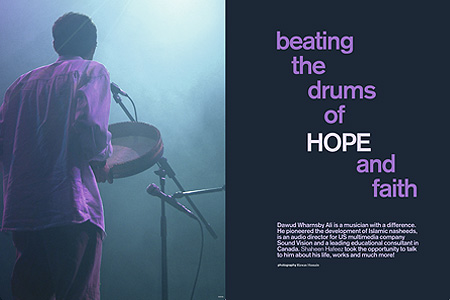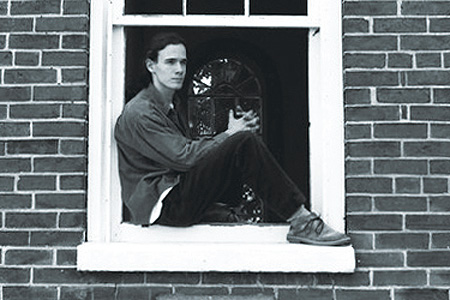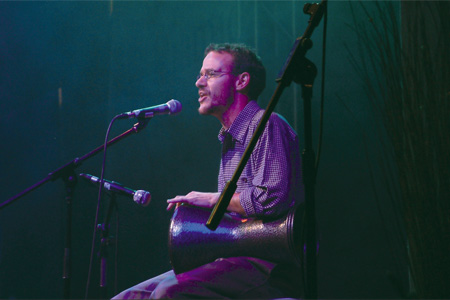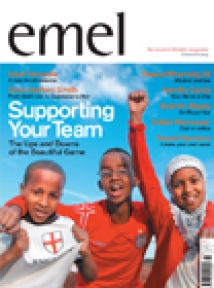
Beating the drums of hope and faith
Issue 6 Jun / Jul 2004
First Published on July/August 2004
To access the issue page, click here
Dawud Wharnsby Ali is a musician with a difference.
He pioneered the development of Islamic nasheeds,
is an audio director for US multimedia company
Sound Vision and a leading educational consultant in
Canada. Shaheen Hafeez took the opportunity to talk
to him about his life, works and much more!
Dawud embraced Islam ten years ago. His journey like many who convert began with a journey of self discovery. “I was never so much ‘interested in Islam’,so much as I was interested in trying tofind out about God; I wanted to discover my purpose in life, and a way to better the world I share with others.”
It was in his late teens that he began reading many scriptures and stories ofthe prophets - ideas about God and the role of human beings on earth. “What I read in the Qur’an, and what I learned from the words of Muhammad, Jesus and others really struck a chord with me, so I chose to implement the wisdom I found.I don’t feel as though I ‘changed’ to any new ‘religion’, rather, I just grew as an individual: I matured spiritually.”
However, for Dawud the journey did not end there. He states very clearly that he is still trying to find out about God, the prophets and his purpose in life. “I believe the proverbial ‘search’ doesn’t end until we die”.
Music has always played an important role in Dawud’s life; he began writing poetry and music at the age of 17 and began performing publicly a year later gaining his inspiration from a broad spectrum of sources, “In those days I was influenced by a lot of folk, R&B and rock music from the 1960s (Bob Dylan, PaulSimon) and 1970s (Pete Townsend, Cat Stevens, Jackson Browne), even some early Rap music from the early 1980s (Grandmaster Flash, Afrika Bambaataa,early Run D.M.C.) It was actually through those early Rap albums where I first learned about the word “Allah”, as some of those hip-hop bands used to thank “Allah-The Creator” on their album jackets.Their music was socially conscious, motivational and rhythmically aggressive.”
As his spiritual learning progressed his music began to reflect this. His first major change was to leave the music business, which he describes as being “heavily focussed on making money and this ruins friendships, intentions and makes you bitter. It is also hard to be honest- artistically and spiritually - in suchan environment. I was tired of trying to compete for success and fight for fame, it made my art feel cheap and my faith feel insincere.”Once Dawud was free from the constraints of the music industry he was able to see the gap in the Muslim community for some kind of artistic, spiritual and cultural expression. He began to concentrate his efforts on addressing this need, “I came up with the CD A Whisperof Peace, it was a simple and sincere effort on my part and I offered it out tothe Muslim community with no fear of it turning into a ‘business venture’.”
The intention behind his nasheeds remain simple: Dawud wants his musicto have a positive impact on the listener and to inspire a greater understanding about Islam. “It was my agenda value our faith, value our opportunity to grow and better ourselves as believers and citizensof the world. Singing to and for myself and Muslims, I can be more explicate in my lyrics, drawing directly from Islamic sources. Some of my music is naturallya little bit more sensitive to the opinions and feelings of a broader audience - still Islamic in its essence, but more ‘holistic’and ‘organic’ than dogmatic.”
A Whisper of Peace became a huge success, which Dawud followed up witha number of equally successful albums including Road to Medina. His song The Veil from that album attracted a lot of attention as it dealt with the controversialtopic of hijab (head covering). Dawud was well aware of the debate that surrounds this issue and was cautious in writing a song about it. After much persuasion from Sound Vision he wrote a song, which originally was for a documentary they were producing entitled Hijab: Act of Faith. His only conditionwas to be advised by a Muslim woman.“ A good friend of mine, Zahra Duran, agreed and sent me a poem she had written which became the thematic basis for the song.

Despite all this, Dawud still has strong feelings about the emphasis placed upon hijab compared to other issues facing Muslim women today. “We spend so much time defending the Qur’an from attacks that it’s sexist, we rant and rave about how Islam gave rights to women over 1400 years ago, but our sisters are still not in position of leadership within our community. Our sisters are still praying next to the shoe-racks while the men have plush carpets beneath their lazy foreheads and our public women’s shelters are full of Muslim women fleeing from abusive husbands and dead-beat dads. The sad reality is that our community does display sexist attitudes to women. Writing a song about Hijab seemed pretty shallow to me in light of the other issues surrounding women that we Muslims are too self-righteous to face.”
His worst fears came true when his song started to become a sort of “anthem” for Muslim women who wear the hijab. “I began to see that some Muslim women look down on others for not covering, or that many Muslim men judge sisters who wear hijab differently from those who don’t. A sister shows up at the mosque one day without hijab and she is treated rudely; she shows up the next day with hijab and she is treated like a queen. Such a scenario is a blatant treatment of the woman as an object, no different than the judgements we see made in secular society of women’s appearances. In the end, it is not about the piece of cloth. It is about the relationship with God, and I know I don’t want anybody judging me so I don’t think it is right for us to judge each other Mens Designer Dress Shirts .”

Dawud’s latest album The Prophet’s Hands is very different from his other offerings. The album has a more reflective mood, with strong insightful lyrics and soul stirring melodies. This was a conscious decision to reflect a progression in his personal and artistic expression. “I included songs which were aimed at making listeners think a little more deeply about faith in general. People of The Boxes for example, is not just a fable with implied reference to Jews and Christians, but it also points out that we who call ourselves ‘Muslims’ are also living in a box sometimes. I wanted to help myself and the listeners realise our own faults too – to stop being so judgmental of others and to get ourselves out of the dogmatic boxes we have trapped ourselves in.”
Dawud’s ability to be introspective and acknowledge issues concerning Muslims is fundamental in solving the problems that trouble the community today. He uses his insight to address some of these concerns through his music. The song Don’t Talk About Muhammad is a fine example of this. “There is a tendency in the Muslim community to play the victim and the target of media and political conspiracies.
Whilst I don’t dispute the media is unfair in its portrayal of Muslims, and that our governments have hidden agendas to protect their financial interests in lands where populations are primarily Muslim, I think we should take up the example of the Prophet and be more ‘in control’ of our reactions and our opportunities to make dawa through personally instigating positive change in our local communities. We must reach out to our neighbours not with an agenda of conversion, but in simple acts of sincere love. We must stop blaming everybody else for our struggles and hardships and start to take action in our own lives through sincere efforts to improve who we are as individuals.”
His diverse interests and his extensive travels bring Dawud into the circle of a lot of people. These interactions are a great source of inspiration for his work, “I feel for, and identify with, individuals on their spiritual journeys - whether those journeys are hard or smooth. That is why I write about the young man who parties all night and finds it hard to get along with his parents; I sing about the Muslim girl murdered by her father and step mother; I write about the death of a close relative and the struggle of dealing with that parting; I write about conflict within marriage; difficulties being a good parent; religious hypocrisy; consumerism; sexual abuse; religious narrow-mindedness; these are all struggles that are very real within our community. Even if I have not felt these struggles first hand, seeing others around me experience such tests does effect me… the social repercussions of these struggles effect us all one way or another.”
Amongst his many projects Dawud has been actively involved in youth work. He is well aware of the difficulties facing young Muslims in the West where more and more Muslims are finding themselves torn between western government ideas and psuedo-religious spokespeople. “We all want to fit into a culture, a community; we want to find a home, security, freedom of faith and lifestyle but these days all those things are threatened. We don’t know whether the 'freedom' in our western democracies means 'free of domination' or 'free to dominate'. Muslim youth are confused and searching for answers. Some are looking towards rigid traditionalism, others to more secular approaches. Many of us are left wondering what is right and what is wrong.”
His advice is simple: “start small, put down the book you’re reading and sit with your grandmother to learn her language and find out about her life’s struggles and her history, before she passes on and your history is lost; put down the TV remote control and stop letting pop culture define who you are and go for a walk through your hometown’s historical landmarks. Find your identity by actually looking for the things in life that appeal to you or stir emotion in you. If you just let your government, your local imam, even your local pop singer or nasheed singer, define what you should be, you will never be more than that. Look in the mirror and ask yourself, ‘Who do I WANT to be?’ Start there.”
So what does the future hold for Dawud? Summer 2004 will see the mainstream release of the album Vacuous Waxing, which he co-wrote with his friend Bill Kocher. It contains a collection of songs with a social conscience and features a broad array of guest artists from around the world. We can also expect a new nasheed CD that he promises will be very different from anything he’s done in the past. There are also plans to publish a book of poetry and an anthology of his nasheed lyrics. As you can see there is a lot to look forward to.
Bookmark this |
|
Add to DIGG |
|
Add to del.icio.us |
|
Stumble this |
|
Share on Facebook |
|
Share this |
|
Send to a Friend |
|
Link to this |
|
Printer Friendly |
|
Print in plain text |
|


Comments
0 Comments